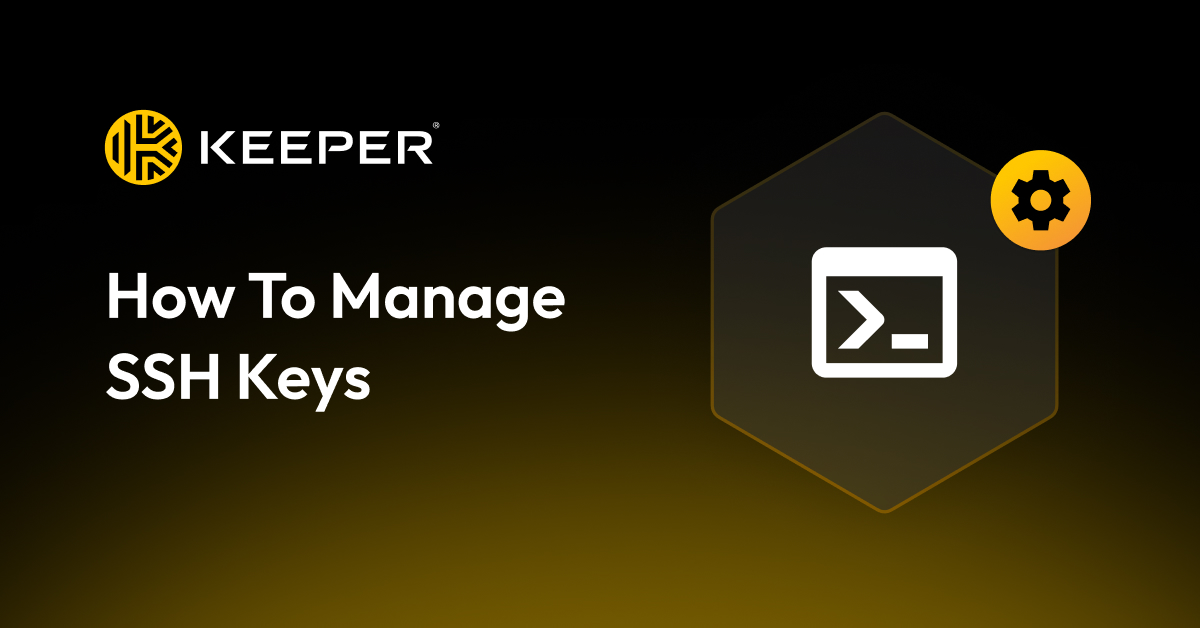SSH Key Management: Best Practices & Solutions
Are your digital fortresses truly secure, or are they vulnerable to attacks that could compromise sensitive data and cripple operations? In today's interconnected world, the effective management of SSH keys is not just a best practiceit's a fundamental necessity for robust cybersecurity.
The landscape of cybersecurity is constantly evolving, with new threats emerging daily. Organizations face a multitude of challenges, from sophisticated phishing attacks to insider threats, all targeting valuable data and systems. One critical aspect of protecting these assets is securing remote access to servers and maintaining the integrity of IT infrastructure. This is where Secure Shell (SSH) keys come into play, acting as a vital safeguard for accessing servers and ensuring encrypted data transmission across networks.
SSH keys offer a more secure alternative to password-based authentication. They provide a method to authenticate SSH connections without requiring a password, which not only speeds up access but also significantly enhances security. By disabling password access and enforcing the use of authorized keys, organizations can drastically reduce the risk of unauthorized access. However, the convenience and enhanced security offered by SSH keys come with their own set of challenges, particularly in terms of management.
- Mercedes Kilmer Life Career Val Kilmers Legacy Latest Updates
- Russell Peters Wife Ali Peters Marriage Details Revealed
Many organizations grapple with the complexity of managing SSH keys at scale. Without proper oversight, keys can proliferate, become outdated, and fall into the wrong hands. This can lead to severe security breaches, data theft, and disruption of critical services. Therefore, understanding SSH key best practices, the underlying mechanics, and the associated risks and benefits is essential. Furthermore, knowing how to effectively manage these keys is paramount for any organization striving for a robust security posture.
Before we delve deeper into the intricacies of SSH key management, let's clarify what we mean by "SSH key." Essentially, an SSH key is a cryptographic key pair consisting of a private key and a public key. The private key is kept secret and is used to digitally sign authentication requests. The public key is placed on the server you wish to access. When a user attempts to connect to the server, the server verifies the user's identity by checking the digital signature against the public key.
The benefits of using SSH keys are numerous. They provide a higher level of security compared to passwords, especially when password authentication is disabled entirely. They streamline the login process, eliminating the need to repeatedly enter passwords. Moreover, they can be used to automate tasks and scripts, providing a seamless experience for both human users and automated systems. However, the effective management of SSH keys is crucial to realize these benefits without introducing new vulnerabilities.
- Alternatives To Vegamovies Safe Streaming In 2024 Beyond
- Teen Leaks On Telegram What You Need To Know Explore
The core problem with SSH key management lies in its inherent complexity. As organizations grow, the number of SSH keys tends to multiply exponentially. Keys are often created and distributed without proper controls, leading to a fragmented and unmanageable environment. This lack of centralized management makes it difficult to track keys, revoke access when necessary, and ensure that keys are rotated regularly to mitigate risks. The manual nature of many SSH key management processes further exacerbates these challenges.
For organizations looking to streamline their SSH key management, a variety of tools and solutions are available. These tools often include features such as centralized key storage, automated key rotation, access control management, and audit logging. Some of the leading contenders in this space include Userify, ManageEngine Key Manager Plus, and SSH Universal Key Manager. These solutions aim to simplify the process of managing SSH keys, reducing the burden on IT administrators and enhancing overall security.
However, simply adopting a tool is not enough. Organizations must also implement robust SSH key management practices. This involves establishing clear policies and procedures for key creation, distribution, and access control. Key rotation should be a standard practice, ensuring that keys are changed periodically to minimize the impact of a potential compromise. It is also essential to monitor key usage and audit access logs to identify any suspicious activity. Furthermore, educating users about the importance of SSH key security is critical to foster a security-conscious culture.
One of the most critical aspects of SSH key management is the ability to control access. This includes assigning and revoking access based on roles and responsibilities, as well as integrating with identity providers such as Active Directory. By integrating with existing identity management systems, organizations can streamline the process of managing SSH key access, ensuring that users only have access to the resources they need. This also simplifies the process of revoking access when employees leave the organization or when a security incident occurs.
Let's delve into the key components of SSH key management. Creating, distributing, and securing SSH keys are fundamental to the process. Then there's the concept of SSH key rotation. Key rotation involves regularly changing SSH keys to limit the impact of a potential compromise. Regular key rotation is a crucial security practice that helps to mitigate the risks associated with stolen or compromised keys. This is particularly important in environments where sensitive data is stored or where unauthorized access could cause significant damage.
In today's cybersecurity landscape, where breaches due to weak or stolen passwords are prevalent, automating SSH key management processes is paramount. This includes automating key generation, distribution, and rotation to enhance security and efficiency. Tools such as Userify and others offer built-in features that can automate these tasks, saving time and reducing the likelihood of human error. Automation also enables organizations to respond quickly to security incidents and mitigate risks effectively.
When considering SSH key management solutions, organizations should evaluate several key factors. These include the ease of integration with existing infrastructure, the level of automation offered, the capabilities for access control and auditing, and the overall cost of ownership. The solution should also be scalable to accommodate future growth and changes in the organization's IT environment. Ultimately, the goal is to find a solution that strikes the right balance between security, usability, and cost-effectiveness.
As organizations mature in their cybersecurity practices, they often move beyond basic SSH key management to implement more advanced strategies. This can include the use of SSH certificate authorities (CAs), which provide a more secure and scalable way to manage SSH keys. SSH CAs issue certificates that are trusted by servers, eliminating the need to manually manage individual public keys. This simplifies the process of granting and revoking access, and enhances security by ensuring that only trusted keys are used.
Another important consideration is the use of hardware security modules (HSMs) or smartcards to protect private keys. HSMs are physical devices that store cryptographic keys securely and perform cryptographic operations. Smartcards offer a similar level of security, protecting private keys from unauthorized access. By using HSMs or smartcards, organizations can ensure that their private keys are protected even if the systems they are stored on are compromised. This adds an extra layer of security and makes it much more difficult for attackers to gain access to sensitive data.
Many organizations are now looking to integrate SSH key management with their broader access and risk management programs. This involves incorporating SSH key management into their overall security policies and procedures. By doing so, organizations can ensure that SSH key management is treated as a critical security function, rather than an afterthought. This also allows organizations to align SSH key management with other security initiatives, such as vulnerability management and incident response.
The best way to implement DevOps SSH key management is to use a secure SSH key management tool, such as Keeper Secrets Manager. Keeper Secrets Manager stores and protects all your SSH keys and other IT infrastructure secrets, creating dynamic programmatic access to your secrets in your existing build systems without requiring any additional. Remote operations are performed through using SSH, SFTP, and SCP. Strong cryptography is provided with AES, ECDSA, ED25519, ChaCha20.
In summary, securing SSH keys is not just about technical solutions; it is about adopting a comprehensive security mindset. Organizations should not only implement the right tools but also establish clear policies, educate users, and regularly review and update their security practices. By taking a proactive and holistic approach to SSH key management, organizations can significantly reduce their risk exposure and protect their valuable assets from increasingly sophisticated cyber threats. SSH key management is therefore a cornerstone of any robust cybersecurity strategy.
As organizations embrace cloud computing, the management of cryptographic keys in the cloud becomes paramount. Cloud providers such as Google Cloud offer tools like Cloud Key Management Service (KMS) to handle and manage cryptographic keys within their ecosystem. These services provide a centralized and secure way to store and manage keys, simplifying key rotation and access control. Organizations should carefully evaluate their cloud key management options to ensure that their keys are protected in the cloud environment.
In this fast-paced digital world, its crucial for organizations to proactively manage their SSH keys, as it provides access to the organization's network and sensitive data. Proper SSH key management ensures they do not fall into the hands of unauthorized users. This involves creating, distributing, and securing the keys, and implementing SSH key rotation. Consider solutions like Userify, which offers built-in recipes for complementary tools such as Ansible, Chef, Puppet, Salt Stack, and Terraform.
For organizations using a multitude of automated systems and M2M (machine-to-machine) connections, the use of a centralized SSH key management tool is essential. Tools like PrivX Key Manager help manage these connections, automate routine tasks, track machine credentials, and audit automated sessions. This ensures that sensitive connections remain secure and compliant. Secure and track your encrypted M2M connections.
In conclusion, effective SSH key management is an essential component of a robust security posture. By understanding the risks and benefits of SSH keys, implementing best practices, and leveraging the right tools and technologies, organizations can significantly reduce their risk exposure and protect their valuable assets. As the cybersecurity landscape continues to evolve, the ability to manage SSH keys effectively will become even more critical.
| Feature | Description |
|---|---|
| SSH Key Generation | Creating secure key pairs (public and private) for authentication. |
| Key Distribution | Securely distributing public keys to servers and systems. |
| Access Control | Managing user access to servers and systems based on keys. |
| Key Rotation | Regularly changing keys to minimize risk. |
| Centralized Management | Managing SSH keys from a central location. |
| Auditing and Logging | Tracking SSH key usage and access attempts. |
| Integration with IAM | Integrating SSH key management with existing Identity and Access Management (IAM) systems. |
| Automation | Automating key generation, distribution, and rotation processes. |
| Compliance | Ensuring SSH key management practices meet regulatory requirements. |
| Monitoring | Monitoring SSH key activity for suspicious behavior. |

SSH Key Management Tools and Best Practices

6 SSH Key Management Best Practices

SSH Key Management Best Practices and Tools Open Source Java SSH